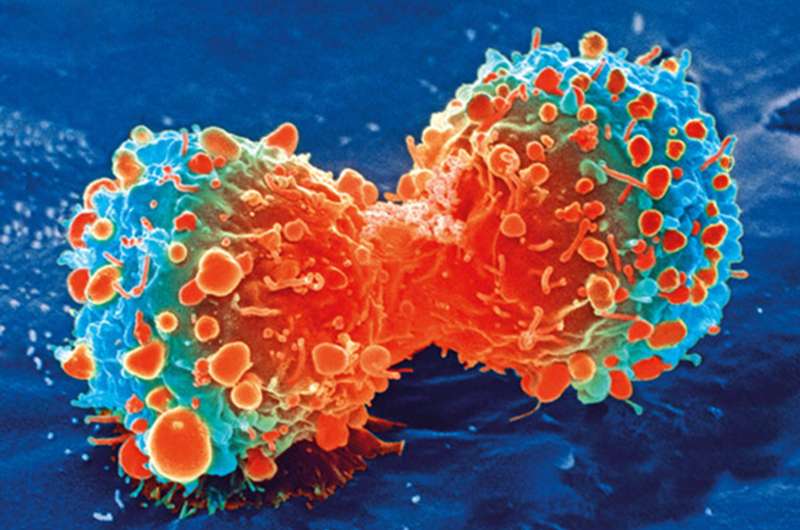New transmission route discovered for malignant pleural mesothelioma

Malignant pleural mesothelioma is divided into three subtypes, one of which is particularly aggressive. Researchers from the Comprehensive Cancer Center (CCC) of MedUni Vienna and Vienna General Hospital have now managed to discover a mechanism that contributes to this aggressive behaviour: The tumour cells of this subtype are able to assume special characteristics that promote migration and therefore spread of the cancer. This is possible because the cells receive the requisite signals for this spread from certain messenger substances, namely the two growth factors FGF2 and EGF. By blockading these signals, it might be possible to develop new approaches for treating this subtype of malignant pleural mesothelioma.
Many mechanisms that cause cancer were originally processes that a healthy body needs to function normally. However, the tumour cells "exploit" these processes to promote tumour growth.
For example, in some instances, such as embryonic development or wound healing, it is essential for cells that are anchored in one spot to be able to migrate. To allow this to happen, a complex modification process is initiated within the cell. This is known as epithelial-mesenchymal transition (EMT). As a result of EMT, the cells change their properties and their appearance. Cells that were once epithelial cells with high cell-cell adhesion and therefore immovable, transform into mesenchymal cells. These are cells with no fixed cell junctions that are therefore able to migrate and spread.
Michael Grusch, molecular biologist at the Institute of Cancer Research and member of the Comprehensive Cancer Center (CCC) of MedUni Vienna/Vienna General Hospital and one of the two principal investigators explains: "EMT plays a key role in the development of metastases and in local spread. Especially in the aggressive forms of malignant pleural mesothelioma, we could see that the tumour cells are very similar in appearance to mesenchymal cells. In a petri dish, we have now investigated which biological signals cause the cancer cells to take on the characteristics of these mesenchymal cells."
The researchers found that, in aggressive malignant pleural mesothelioma, EMT is triggered by defined signals. These are, in fact, a group of so-called fibroblast growth factors (FGF2) and epidermal growth factors (EGF). These signaling substances bind to receptors on the surface of the tumour cells and forward the signal to modify into the cell interior.
Says Karin Schelch, Institute of Cancer Research of MedUni Vienna, member of the CCC and lead author of the study: "If FGF2 and EGF are in play, the tumour subtype becomes more aggressive."
Signal blockade as new therapeutic approach
In a further step, the researchers showed that tumour cells lost their aggressive characteristics again as soon as they encountered substances that blockade the effect of FGF2 and EGF. Says Mir Ali Reza Hoda, Department of Surgery of MedUni Vienna/Vienna General Hospital, member of the Comprehensive Cancer Center (CCC) of the two institutions and second lead author: "Our results help to provide a better understanding of the disease. Blockading these signals could therefore offer new approaches for treating certain aggressive forms of mesothelioma.
About mesothelioma
With around 90 new cases per year in Austria, malignant pleural mesothelioma is one of the rarer forms of cancer. However, it is on the increase. Malignant pleural mesothelioma is a very aggressive form of cancer that is associated with asbestos and is routinely treated with a combination of chemotherapy, surgery and radiotherapy. Since this particular type of tumour often develops resistance to chemotherapy and radiotherapy, the prognosis is very poor. Around 15% of all cases involve the particularly aggressive form of pleural mesothelioma, which was the subject of the research project.
More information: Karin Schelch et al. FGF2 and EGF induce epithelial–mesenchymal transition in malignant pleural mesothelioma cells via a MAPKinase/MMP1 signal, Carcinogenesis (2018). DOI: 10.1093/carcin/bgy018
















